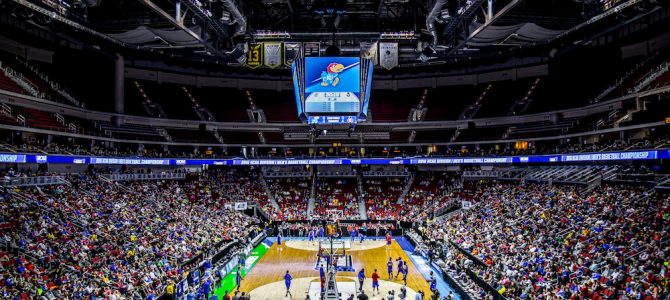
It’s that time of year when America pauses for a few weeks as we attempt to crown a collegiate basketball champion. Starting on selection Sunday, Americans filled out roughly 80 million brackets before Thursday’s first tipoff, spending approximately $10 billion on office pools and group bets, according to the American Gaming Association. That’s more than twice what was wagered in the U.S. on the Super Bowl.
Concurrently, American companies lost $4 billion in worker productivity last week with one hour dedicated to filling out brackets and three hours dedicated to watching games while on the clock.
In short, the NCAA’s March Madness and Bracketology have become a universally accepted way for Americans to participate in one of the biggest forms of recreation ever. The only problem: it’s all against the law.
Annual Sports Betting Is Popular—And Illegal
Federal law prohibits sports betting, and individual states are banned from sanctioning it. In our home state of North Carolina, despite having five college teams in the tournament—including No. 1 seed UNC and No. 2 seed Duke—the state is prohibited from regulating the activity. Therefore, North Carolina cannot collect any of the millions of dollars in tax revenue that could potentially be generated from a regulated, legal commerce activity. The federal statute makes any of us who engage in a friendly office bracket pool, no matter how small, a criminal.
Yet despite this legal prohibition of sports wagering, the annual sports betting activity in the U.S. is estimated at $150 billion to $400 billion. And most of it is happening off shore or through the dark net—without transparency or consumer protection. According to AGA estimates, 80 percent of the $10 billion bet on the NCAA tournament will be done illegally.
The federal sanction on sports betting flies in the face of federalism. States should be free to regulate economic activity within their borders as they see fit. Washington should not usurp state authority, no matter your position on sports betting or your party affiliation. This is not a partisan issue—it’s a paternalism one. If you’re at least 18 years-old, you should be legally free to participate in the NCAA office pool wager. Do we really need the federal government dictating how we should spend our own after-tax money? Why should the feds care if we bet on sporting events or play online poker? It’s our money. We are adults. A little more freedom, a little less government, and a little more personal responsibility sound like a winning combination. We’ll take that bet.
Why The NCAA Doesn’t Like Sports Betting
The biggest argument against sports betting usually comes from sports leagues themselves. In particular, the NCAA claims that allowing sports betting to be open, legal, and transparent would lead to destruction of the “integrity” of the competition. Until the early 1990s, states were responsible to regulate all forms of gaming, but because Congress agreed with the NCAA’s argument that legal sport gaming could lead to a loss of public trust in sports competition, we saw passage of the Professional and Amateur Sports Protection Act in 1992. The act barred all states, with the exception of Nevada, from legalizing sports betting.
Like most federal intrusions into state matters or consumer protection acts, the results are far different than the original intent. Since the enactment of PASPA, sports wagering has grown by a factor of 10.
If the NCAA is truly committed to the integrity of competition, shouldn’t that also include the participants? If the NCAA set aside just 1.5 percent of their annual media rights for the Men’s Basketball Tournament, they could provide $20,000 to each basketball student athlete in the form of a post graduate subsidy. That would show a true commitment to the future well-being of the collegiate basketball labor pool, not just the small percentage of the ones who will be cashing in at the next level.
Companies Like Google Can Help Prevent Corruption
Perhaps the only thing growing faster than our appetite to bet on sports is our ability to use sophisticated data analysis technology to predict and detect problems. Rather than seeing legal sports betting as the enemy of sports competition, we should see it as an ally to protect sports. Using powerful algorithms, sports leagues (the NCAA included) can use sports wagering technology as an “early warning system” to uncover potential signs of corruption.
Major data companies like Google, Microsoft and Yahoo are way down the road on technologies to aid in the operation of legal sports betting. The Commodity Futures Trading Commission, which regulates the futures and options markets, has already received correspondence from tech and big data companies in support of expanding what the industry refers to as “prediction markets” into the public sphere. According to some sources, it is believed CFTC is already considering the legality of trading/exchange-type platforms that could be used for sports wagering.
Someday Soon, Your Bracket May Be Lawful Again
Certain states are also preparing for a future that includes legal sports betting. Pennsylvania, New Jersey and New York are challenging PASPA in various courts. With budget challenges, unfunded pension liabilities and other fiscal concerns, you can bet more states will join the fight. There is just too much money flowing offshore and into the dark net for state leaders to ignore the potential windfall of a regulated, taxed industry like sports wagering.
Despite the efforts of sports organizations like the NCAA to continue to make office pools a criminal activity, we think those days are numbered. One day soon, perhaps you’ll be able to participate in March Madness without the fear of feds knocking on your door.
So good luck to all of you criminals on your brackets—those that have not already been busted.









